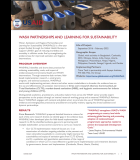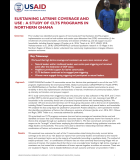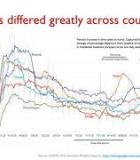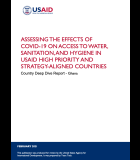Sustainable Coastal Communities and Ecosystems – Ghana (SUCCESS-Ghana)
Employing good governance initiatives, sustainable livelihoods enterprises, capacity development, low-impact aquaculture ventures, and responsible conservation and management of near-shore fisheries and marine areas, SUCCESS pursued its objectives of protecting biodiversity, building climate change resilience and imparting skills and knowledge necessary for people to better manage their natural resources and their future. As SUCCESS evolved, the focus shifted from fieldwork to global leadership in capacity development, knowledge management and learning in biodiversity, climate change, fisheries and livelihoods.
Activity Description
SUCCESS promoted reform in the policy and practice of nearshore fisheries upon which so many coastal communities in developing countries depend, but which unless better managed are in rapid decline as a food source; and by introducing alternative food sources such as low impact marine agriculture options. SUCCESS also helped identify and share lessons learned about livelihoods strategies that can help reduce poverty in communities—by providing food and income—but through an approach that also sustains and promotes the health of the biodiversity-rich resources upon which this very food and income depends. It also helped best practices that “support” policies that should be in place, whether those are policies and laws focused on a reformed sustainable fisheries and/or policies that recognize and mainstream considerations of the impacts from climate change.
Expected Outcomes
- Promote the sustainable use of marine resources
- Conserve marine biodiversity
- Improve food and income security
- Enhance adaptive capacity and resiliency through improved governance
Actual Outcomes
- Approximately 220,000 hectares of marine and terrestrial biologically significant areas under improved management
- Over 14,000 hectares in areas of biological significance showing improved biophysical conditions for selected parameters
- Eleven policies, laws, agreements, or regulations promoting sustainable natural resource management and conservation implemented
- 4,359 persons participated in coastal resources and conservation planning initiatives (45 % women)





